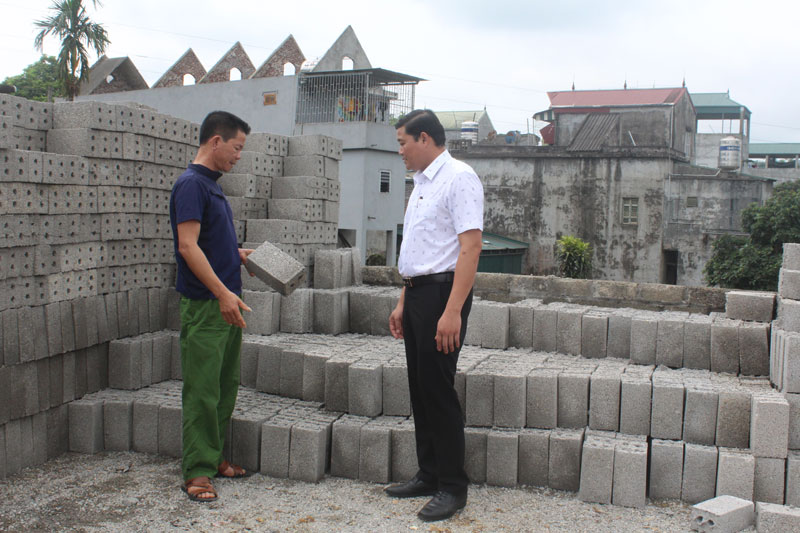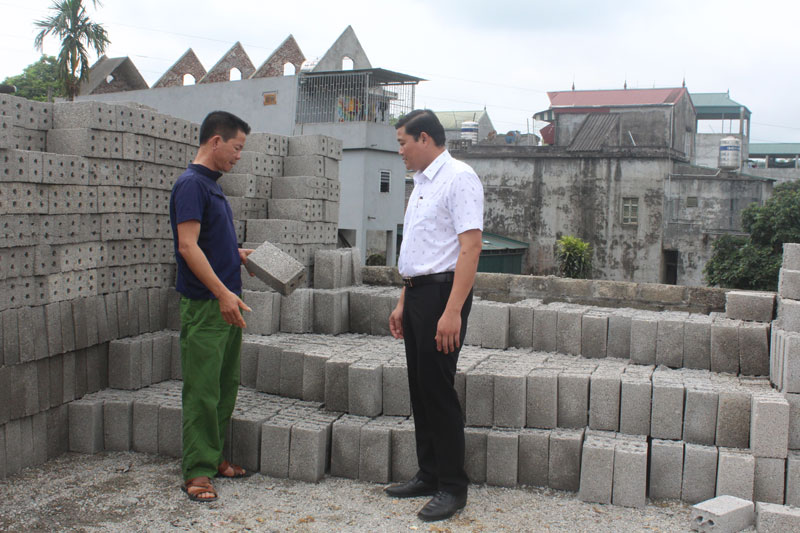
(HBO) – Officials and locals in Tay Phong commune of Cao Phong district on May 10 received a certificate recognizing the commune as a new-style rural area from the Chairman of the provincial People’s Committee.
Chairman of the
commune People’s Committee Bui Van Ben said that the commune has 1,320
households with 5,390 people, 58 percent of whom belong to the Muong ethnic
group, 37 percent are Kinh people, and 5 percent belong to the Dao ethnic
minority group. Following the Party and State’s policies on the new-style rural
area building, Tay Phong had registered to fulfill all criteria in 2018. Under
the leadership of the Party organisations and authorities from the district to
grassroots levels, the commune’s economy has developed strongly, and
defence-security been ensured.
 Many households in Tay Phong
commune invest in expanding production, thus contributing to shifting the
commune’s economic structure.
Many households in Tay Phong
commune invest in expanding production, thus contributing to shifting the
commune’s economic structure.
Implementing
socio-economic development tasks in general and ethnic work in particular, Tay
Phong commune’s authorities have had comprehensive management over all fields
with the focus on building plans and tasks for each year and the 2014-2019
period, and aimed at reaching or surpassing criteria set in the resolution of
the commune Party Committee in the 2015-2020 period and resolutions of the
commune People’s Council every year.
With a policy of
diversifying industries to step by step shift the economic structure, in the
past five years, the commune enjoys an average annual growth rate of 12.5
percent. At present, per capita income reaches 29.5 million VND a year, and the
poverty rate is brought from 18.6 percent in 2014 to 8.03 percent.
In addition, the
locality’s electricity, road, education and healthcare systems have also been improved,
helping raise locals’ living conditions. Local residents have also paid
attention to maintaining and promoting cultural identities./.
According to data from the Hoa Binh Provincial Party Committee, the industrial production index for the first six months of 2025 is estimated to have increased by 20% compared to the same period last year. This marks the highest year-on-year growth rate for this period since 2020.
In the first six months of 2025, Hoa Binh province’s export turnover was estimated at 1.145 billion USD, marking an 18.11% increase compared to the same period in 2024. Import turnover was estimated at $ 804 million, a 17.15% increase, which helped the province maintain a positive trade balance.
The lives of the ethnic minority farmers in Tan Lac district have gradually improved thanks to the new directions in agricultural production. This is a testament to the collective strength fostered through the professional associations and groups implemented by various levels of the district’s Farmers’ Union.
With the motto the "product quality comes first,” after nearly one year of establishment and operation, Muong village’s Clean Food Agricultural and Commercial Cooperative, located in Cau Hamlet, Hung Son Commune (Kim Boi district), has launched reputable, high-quality agricultural products to the market that are well-received by consumers. The products such as Muong village’s pork sausage, salt-cured chicken, and salt-cured pork hocks have gradually carved out a place in the market and they are on the path to obtaining the OCOP certification.
In the past, the phrase "bumper harvest, rock-bottom prices" was a familiar refrain for Vietnamese farmers engaged in fragmented, small-scale agriculture. But today, a new spirit is emerging across rural areas of Hoa Binh province - one of collaboration, organisation, and collective economic models that provide a stable foundation for production.
Maintaining growing area codes and packing facility codes in accordance with regulations is a mandatory requirement for agricultural products to be eligible for export. Recently, the Department of Agriculture and Environment of Hoa Binh province has intensified technical supervision of designated farming areas and packing facilities to safeguard the "green passport" that enables its products to access international markets.



 Many households in Tay Phong
commune invest in expanding production, thus contributing to shifting the
commune’s economic structure.
Many households in Tay Phong
commune invest in expanding production, thus contributing to shifting the
commune’s economic structure.